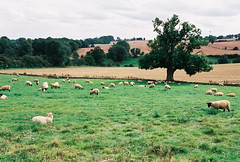 Beddome clearly took the view that when God's people meet, they meet to worship.
Beddome clearly took the view that when God's people meet, they meet to worship.29/03/2007
Hymn Public worship 579
 Beddome clearly took the view that when God's people meet, they meet to worship.
Beddome clearly took the view that when God's people meet, they meet to worship.23/03/2007
Hymn Giving of the Law 358
 358 Giving of the Law LM
358 Giving of the Law LM 5 Christ is our shield, and he our sun,
His presence sends our fears away;
'Tis a dark night when he is gone,
When he appears 'tis light and day.
5 Christ is our shield, and he our sun,
His presence sends our fears away;
'Tis a dark night when he is gone,
When he appears 'tis light and day.22/03/2007
Hymn Sinai and Zion 337
21/03/2007
Hymn Love To God 591
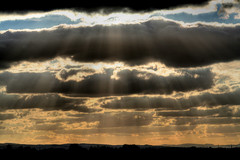
20/03/2007
Hymn Final Impenitence 398
ALLURED by sin's deceitful arts,
Unhappy men depart from God;
To Satan yield their treacherous hearts;
And fearless tread the downward road.
2 Still they increase their load of guilt,
Thoughtless amidst a thousand woes;
Or if some pangs of grief are felt,
Those pangs they quickly lose.
3 They bid defiance to the skies,
And dare th’ Almighty to his face,
His awful threatenings they despise,
And cast contempt upon his grace.
4 But the decisive day will come
And universal terror spread;
Then God will fix their final doom,
And vengeance strike the rebels dead.
Their numerous follies they will mourn;
Shall suffer unremitting pains,
And ever sin and ever burn.
19/03/2007
Hymn Divine Sovereignty 19
19 Divine Sovereignty CM
THE potter different vessels forms Of the same lump of clay And may not God, o'er sinful worms, An equal power display?
Is it not meet that he should deal His sovereign favours still; And his own purposes conceal, While he performs his will?
Great Lord supreme, we must submit, Nor call thy ways unjust; Thou art the Father infinite, And we but worms and dust.
17/03/2007
Anne Steele
Hymn Prayer 408
16/03/2007
Hymn Come, Lord Jesus 786
2 Long has the aspiring saint Stood waiting for the call, And joyful now without a 'plaint, Can leave this empty ball.
15/03/2007
Sermon reprint
Hymn Saviour's Condescension 88
14/03/2007
Hymn Jacob's Vow 335
13/03/2007
Hymn Jacob's Ladder 334
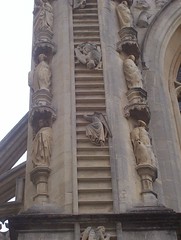 |
| Bath Cathedral |
12/03/2007
Hymn Saints Sinners 328
10/03/2007
Hymn New Members 648
09/03/2007
Hymn Lot and Sodom 333
08/03/2007
Hymn Desiring the Divine Presence 560
560 Desiring the Divine Presence CM
UNVEIL thy face most holy Lord, And fill my heart with joy; Thy glories then shall tune my tongue, And all my thoughts employ.
2 Should I be plunged in deep distress, And earthly comforts flee; Yet might I say that thou art mine, ’Twould be enough for me.
3 If in a dungeon dark confined, I still enjoyed thy smile; This would at once disperse the gloom And all my cares beguile. 4 If in a lonely wilderness, My dwelling place should be; Grant me thy presence, and I want No other company.
5 In danger thou art my defence, My help in time of need Whilst others are but friends in name, Thou art a friend indeed.
07/03/2007
Hymn Fear Not
YE trembling souls, dismiss your fears,
Be mercy all your theme;
Mercy, which like a river flows,
In one perpetual stream.
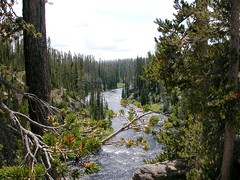
2 ‘Fear not’ the powers of earth and hell,
God will those powers restrain;
His arm shall all their rage repel,
And make their efforts vain.
3 ‘Fear not’ the want of outward good
For his he will provide;
Grant them supplies of daily food
And give them heaven beside.
4 ‘Fear not’ that he will e’er forsake,
Or leave his work undone;
He’s faithful to his promises,
And faithful to his Son.
5 ‘Fear not’ the terrors of the grave,
Or death’s tremendous sting;
He will from endless wrath preserve,
To endless glory bring.
06/03/2007
Hymn Noah's Covenant 332
05/03/2007
The Seward Connection
 John Seward (b 1668) is described by Arnold Dallimore in his biography of Whitefield as ‘a country squire’. He and his wife Mary moved to Badsey, near Evesham, Worcestershire, in the late seventeenth century. They were Anglicans and had as many as seven sons. The large stone house that would be the family home for the next hundred years is still known as Seward House today [see pic].
John Seward (b 1668) is described by Arnold Dallimore in his biography of Whitefield as ‘a country squire’. He and his wife Mary moved to Badsey, near Evesham, Worcestershire, in the late seventeenth century. They were Anglicans and had as many as seven sons. The large stone house that would be the family home for the next hundred years is still known as Seward House today [see pic].Their most famous son was their fourth, William Seward (1702-1740), ‘the first martyr of Methodism’. In the 1720s he moved to London where he became a successful stockbroker. A religious man active in promoting charity schools, in 1738, following his wife’s death and a spiritual awakening, he met Charles Wesley at the Fetter Lane assembly. He was soon converted and became a generous financial supporter of Methodist causes, a source of some tension with his family and eventually some consternation to himself. He soon became a very close companion to George Whitefield. Dallimore speaks of ‘an exceptionally earnest Christian and a most faithful helper’ who ‘served the Lord with a flaming devotion’. In 1739 he accompanied Whitefield to Georgia as what the ODNB calls a 'fund-raiser, business co-ordinator, and publicist'. He organised printed support in England, including 'paid newspaper advertisements purporting to be news articles'. He did this on both sides of the Atlantic. He sent a poem to colonial newspapers, the first stanza of which ran
Has all my soul possest,
For sure some Seraph from above
Inspires his Godlike Breast.(Trefeca MS 3174)
He returned to Britain in 1740, among other things, to raise funds for the Orphan House and negotiate with the Georgia trustees concerning several important matters, including urging the use of black slaves in the new colony.
He also began open-air evangelistic preaching, something for which he was probably not suited. Preaching with Hywel Harris in South Wales he encountered hostile crowds and was injured. Then, in the October, at Hay-on-Wye, he was heavily stoned by a violent mob. A few days later he died from a wound to the head. He is buried near Hay, in the village churchyard at Cusop. Dallimore commends his zeal but questions how much it was according to knowledge and speaks of his baneful influence on Whitefield. Seward died intestate and although he had provided for his only daughter, all the help he had previously been giving to Whitefield now suddenly dried up. The debt on the Georgia orphanage became something of an albatross around Whitefield’s neck.
Little is known of the second son Edward Seward. Two other brothers, Francis Seward (d 1732) and Thomas Seward (1708-1790. See ODNB) became Anglican ministers and remained unsympathetic to Methodism. In his journal John Wesley apparently speaks of Thomas as ‘pleasure- and preferment-seeking’. The eldest surviving brother, Henry Seward (b 1695, a yet older son John Seward died in 1728) married a Mary White of Wickhamford when he was 60 (1755), and, according to Tyerman’s biography of Whitefield, was a violent opponent of Methodism. In his journal, Charles Wesley describes threats and even actual physical violence from Henry during his brother Benjamin’s illness, the illness he sustained just prior to his conversion.
Both Benjamin and his wife Elizabeth went on to be members of the Baptist church at Bengeworth near Evesham, where John Beddome had once ministered. Even by August, 1739, when Charles Wesley visited Evesham and stayed with them, they had already come to a Particular Baptist persuasion. Wesley describes in his journal how Benjamin, unlike his wife, appeared sympathetic to the Arminian scheme – ‘polite’ would perhaps be more accurate. She, says Wesley, ‘refuses to see me,’ and ‘is miserably bigoted to the particular scheme’. He adds later
‘Here I cannot but observe the narrow spirit of those that hold particular redemption. I have had no disputes with them, yet they have me in abomination. Mrs Seward is irreconcilably angry with me; ‘for he offers Christ to all’. Her maids are of the same spirit; and their Baptist teacher insisted that I ought to have my gown stripped over my ear.
When Mr Seward, in my hearing, exhorted one of the maids to a concern for her salvation, she answered, ‘It was to no purpose; she could do nothing.’ The same answer he received from his daughter, of seven years old. See the genuine fruits of this blessed doctrine!’
Benjamin Seward was eventually baptised in 1742, his wife probably earlier.
One other thing to note about Benjamin is that he wrote at least one hymn. Six verses are quoted by Tyerman. It begins
And mark the bright celestial way
Within my breast erect thy throne
Nor let me fain through long delay.
In 1753 Benjamin and then Elizabeth Seward both died. John Gill was the preacher at Benjamin’s funeral. Gill spoke of him as 'a gentleman of fine natural parts and good sense; he had a peculiar sweetness of temper, scarce ever known to be ruffled, discomposed, fretful and impatient, upon any occasion; which singular good nature, as it is commonly called, adorned with the grace of God, set him in a most amiable light, and caused him to shine in a most pleasing manner to all that knew him.' His humility and generosity were also praised.
In her will Elizabeth devoted the proceeds of the settled interest of a sum of £4,550 to charitable purposes to benefit the ministers and the poor of various Baptist causes. This charitable trust was to be overseen by seven Baptist ministers, including the minister at Bengeworth, Jacob Mower; Dr John Gill and Benjamin Beddome. Beddome not only had fraternal links with the Bengeworth church but was a very good friend of the will’s two executors, Bourton residents Richard Hall and William Snooke. Hall and Snook were sons-in-law to Benjamin and Elizabeth Seward. Holmes refers to Sister Hardiman as one who, despite her behaviour, benefited from the Seward fund.
The Sewards had two daughters. We have previously indicated how Frances and Elinor, respectively, married William Snooke and Richard Hall and came to live in Bourton. In a fascinating anecdote written by Caroline Mary Griffith, in Bath, on June 6th, 1912, (found here) for a relative in Brisbane, Australia, she recalls a family story that says that 'the two friends, Richard Hall and William Snooke, were ‘gentlemen’, and rather eccentric ones, of Bourton on the Water. My aunt used to tell a story of some extraordinary arrangement they made between themselves, (based on the expectation that one sister, who was delicate, would die first), in order to keep the Seward property to which their wives were heiresses, from going out of the family. But the wrong sister died, with the result that the usual fate of the Griffiths in money matters happened, ie not much of the property came to that side of the family in (sic) which our great grandmother Martha Hall belonged.'
The arrangement sounds more like village gossip than a reliable fact but is interesting nevertheless. Martha was the first of three children born to Richard and Elinor, the other two being boys. The same article speaks of the Sewards as cultured and wealthy people and suggests correctly that Anna Seward, the poetess, was aunt to Elinor and Frances.
The Halls were not living in Bourton in 1764 although they were frequent visitors. In the archive at the Angus Library there is a letter from Beddome, dated February 18th, to ‘Richard Hall, hosier, of Red Lion Street, Southwark’. Written on a Saturday afternoon, this friendly letter asks Hall to purchase stock to the value of £100 and also mentions Mr Snooke. It has the greeting ‘to my good friend Mrs Hall’ and contains a hymn for her ‘By night, by day, at home, abroad’. Presumably Beddome had just completed it for singing the next day. The hymn is Hymn 498 in the posthumous hymnal.
The Snookes had four girls – Sophy, Eliza, Maria and Martha. Richard had two sons and a daughter. Following Elinor’s death in 1780, did Richard marry Martha Snooke, to whom Anna Nancy and Benjamin Snooke were born? Actually it was William Snooke's sister, Betty Snooke (1743–1818). Their son Richard was father to Benjamin Snooke Hall who became a member at Bourton and went on to minister at Burford in 1830, according to Holmes. He was a subscriber to the book of Beddome sermons published in 1825.
(Main sources: Journals of Charles Wesley and George Whitefield; Tyerman and Dallimore’s biographies of Whitefield; letter in Angus Library Archive. Online materials including this one)
Beddome OOP
This is the conclusion of the essay I wrote a few years ago on which this blog has so far been largely based. A fine Baptist historian has recently been in touch with me about pursuing the proposal and hopefully it will be possible to do something in the next few years.
04/03/2007
Hymn Winter and Spring 723
His Writings 03
It is clear that despite early deficiencies, Beddome was a greatly used preacher and as he matured he was among the most acceptable Baptist preachers of his day. Robert Hall (1764-1831) spoke of there being ‘bone and sinew and marrow in them which shows a great mind’. (This is a marginal comment in a book of Beddome sermons quoted in a life of Hall by J W Morris. Cf Homes, 68. In an appendix he quotes Hall saying ‘I do not know any sermons of the kind equal to them in the English language’). Rippon’s Baptist Register (320) says of Beddome,
'Though his voice was low, his delivery was forcible and demanded attention. He addressed the hearts and consciences of his hearers. His inventive faculty was extraordinary and threw an endless variety into his public services. Nature, providence and grace had formed him for eminence in the church of Christ.’
And earlier,
The labours of this good man were unremitted and evangelical. He fed them with the finest of the wheat. No man in all his connexions wrote more sermons, nor composed them with greater care - and this was true of him to the last weeks of his life. In most of his discourses the application of a student and the ability of a divine were visible.
He also remarks on his wide knowledge of Scripture and his gift for apt quotation of texts to bolster his arguments. As for his theology he was, it says, opposed to Arminianism and to Antinomianism. He held that believers are delivered from the Law as a covenant of works but subject to it as a rule of life. (Cf eg Sermon XVI ‘The right use of the law’, Volume II, 134).
In his preface to the hymn collection of 1817, Robert Hall agreed. He favourably notes Beddome’s wide reading, deep learning, originality and his ‘chaste, terse and nervous diction’. He also observes how,
As a preacher, he was universally admired for the piety and unction of his sentiments, the felicity of his arrangement, and the purity, force and simplicity of his language, all of which were recommended by a delivery perfectly natural and graceful. (Robert Hall, Recommendatory preface, Hymns)
Brooks says
'His invention seemed almost unlimited; while the extent and correctness of his Biblical knowledge were evidently great .... In the pulpit he was emphatically at home. He completely overcame the defect of his early efforts; and by high and various endowments succeeded in arresting the attention and exciting the feelings of the most numerous auditories.' (Brooks, 61).
The Baptist Register says that he often took unusual texts but made them familiar and clear. With a familiar text he, ‘distributed it with novelty, discussed it with genius, and seldom delivered a hackneyed discourse.’ In his mature years he had great facility as an extempore preacher. A C Underwood, quoting Rippon, speaks of his ability to ‘sketch his picture at the foot of the pulpit, to colour it as he was ascending, and, without turning is eyes from the canvas, in the same hour, to give it all the finish of a master’. (A C Underwood, A history of the English Baptists, London, Kingsgate Press, 1947, 140).
A classic example occurred at a ministers’ meeting in Fairford, Gloucestershire. He did not use notes and for some reason as he came to preach he forgot what the sermon was to be. On the way from pew to pulpit he leaned over and asked the church’s pastor ‘Brother Davis, what must I preach from?’ Thinking it an odd remark Davis replied, in rebuke, ‘Ask no foolish questions’. Not understanding correctly, Beddome went on to deliver a ‘remarkably methodical, correct, and useful’ sermon on Titus 3:9 ‘Avoid foolish questions’! ( This sermon appears to be Sermon X in Volume V, see Beddomes’ One Hundred Village Sermons, London, Samuel Burton and Simpkin and Marshall, 1825, Volume V, 84).
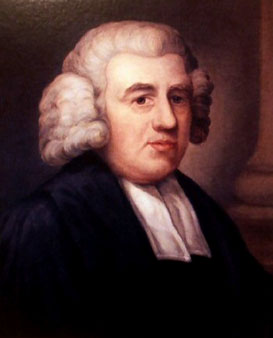 He was appreciated not only by fellow Baptists. For example on August 7, 1776, John Sutcliff (1752-1814) was ordained to the Baptist church at Olney, Buckinghamshire. Beddome did not take part but was present and was prevailed upon to preach in the evening. He preached on Zechariah 11:12. John Newton, then vicar of Olney, was present and wrote in his diary ‘He is an admirable preacher, simple, savoury, weighty’. (Haykin, 167. Also found in Haykin’s biography of Sutcliff, One heart and one soul, John Sutcliff of Olney, his friends and his times, Darlington, Evangelical Press, 1994, 118-120). Newton had also heard him the previous June on 2 Corinthians 1:24. The sermon ‘gave me a pleasure I seldom find in hearing. It was an excellent discourse indeed, and the Lord was pleased to give me some softenings and relentings of heart. (Cf also Haykin, 167 and Haykin, Sutcliff, 118-120. The diaries of Newton are kept at Princeton University).
He was appreciated not only by fellow Baptists. For example on August 7, 1776, John Sutcliff (1752-1814) was ordained to the Baptist church at Olney, Buckinghamshire. Beddome did not take part but was present and was prevailed upon to preach in the evening. He preached on Zechariah 11:12. John Newton, then vicar of Olney, was present and wrote in his diary ‘He is an admirable preacher, simple, savoury, weighty’. (Haykin, 167. Also found in Haykin’s biography of Sutcliff, One heart and one soul, John Sutcliff of Olney, his friends and his times, Darlington, Evangelical Press, 1994, 118-120). Newton had also heard him the previous June on 2 Corinthians 1:24. The sermon ‘gave me a pleasure I seldom find in hearing. It was an excellent discourse indeed, and the Lord was pleased to give me some softenings and relentings of heart. (Cf also Haykin, 167 and Haykin, Sutcliff, 118-120. The diaries of Newton are kept at Princeton University).Between 1807 and 1820 a number of his sermons were printed in a series of eight slim volumes. They contain 20 sermons each (except for the last which has only 18) under the title ‘Short discourses adapted to village worship or the devotion of the family’. By 1824 one volume was in its sixth edition and by 1831 another was in its fifth. These volumes were also issued in larger combined form and in 1835 another set of 67 sermons was published. The sermons were undoubtedly popular. Spurgeon is one eminent 19th Century preacher who refers to them. (See references to them in his Treasury of David for example. According to J R Watson, Spurgeon also liked Beddome’s hymns. The Evangelical Library copy of the fourth edition of Volume 4, published 1817, has pencil markings suggesting that some sermons were read to congregations in the Sussex area between 1836 and 1862).
They are textual sermons, although there is a run of eight sermons on 1 Thessalonians 5:16-22 in Volume IV and occasional pairs of sermons such as a pair on self-examination (from Psalm 139), another on Hebrews 12:14, on Acts 16:29-31 and a fourth on Revelation 3:20 The heavenly stranger and The heavenly stranger received. They cover a fairly broad range of Scripture, from Exodus 13:21 to Revelation 17:14 (the heavenly calling). There are awakening sermons such as that on ‘Views of death’ (Rev 6:7, 8) or ‘The sin and danger of delay in matters of religion’; evangelistic ones such as that on ‘Seeking the Lord’ (Matt 28:5) or ‘Free forgiveness’ (Lk 7:42); searching ones such as that on ‘The distinguishing character of Christians’ (Jn 17:16) or ‘On the folly of profession without forethought’ (Lk 14:28) and sanctifying sermons such as that on ‘The Christian’s pursuit’ (Ps 63:10) or ‘The duty of imitating God’ (Eph 5:1).
Brooks (61) says of the written sermons, ‘Admired for their evangelical sentiments and practical tendency, they are scarcely less pleasing in the simplicity and clearness of their style.’ The sermons are based on notes and so cannot properly represent the actual preaching. However, in recent years Peter Naylor (Picking up a pin, 59) has commended them as 'models of the art of preaching, displaying as they do a lively understanding both of Scripture and of the soul of man.'
He cites Beddome (60) as a living embodiment of his own dictum, 'All that ministers can do is to persuade; God must do the rest. Without his efficacious influence, all the force of reasoning, and all the charms of eloquence will be lost. Paul may plant, and Apollos water; but it is God that giveth the increase.'
03/03/2007
Hymn Family altar 568
02/03/2007
Montgomery on Beddome
His Writings 02
Beddome is most remembered today as a hymn writer. Hymn singing had been something of a controversy among Baptists for much of the first half of the 18th Century. Michael Haykin notes the significance of the fact that John Beddome came out strongly on the side of the singers. (See Haykin, BPB 1, 169).
Benjamin Beddome loved to write poetry and when he became a minister himself he followed the practice of several other ministers of the period, producing a weekly hymn for the congregation to sing following his morning sermon. This was as a supplement to the hymns in Watts’ and Rippon’s Selections. There were no power point screens, OHPs or printed sheets or books for everyone then, of course, and so hymns were often ‘lined out’ two lines at a time by the clerk and sung in that fashion. Beddome wrote well over 800 hymns altogether as well as other poems.
The hymns circulated first in manuscript form. In 1769 The Bristol Baptist Collection compiled by John Ash of Pershore (1724-1779) and Caleb Evans of Bristol (1737-1791) was published. It included some 13 hymns by Beddome. In 1787, the influential London pastor John Rippon (1750-1836) produced his famous Selection. This contained some 36 hymns by Beddome. (Cf John Julian, Dictionary of hymnology, 2nd Edition, London, John Murray, 1907, 121. Article by W R Stevenson). The Selection eventually went through many editions.
Some hymns could also be found appended to printed sermons but it was not until more than 20 years after his death that the hymns were collected together and published in one volume. This collection of 830 hymns was published in 1818 by an anonymous editor with an introduction by Robert Hall Junior. It bore the title Hymns adapted to Public Worship or Family Devotion, now first published from the manuscripts of the late Rev Benjamin Beddome MA. It would appear that this collection was assembled chiefly by use of a fascinating collection of notebooks containing a fair copy of each one with dates. A number of loose copies in Beddome’s own hand and from his later years also appear to have been used.
(This material is in the archive at the Angus Library. A librarian has added a note suggesting that Hall’s wife was responsible for preserving these hymns in the ms notebooks. The editor himself mentions receiving the notebooks from the Beddome family and says that the descendants of a Rev W[illiam] Christian [d 1765], of Shepshed Baptist Church, Leicester, preserved other hymns. Presumably these latter are the loose papers in Beddome’s own hand (about 40). Other ms hymns exist in the college in Bristol.)
In the book, the editor has divided Beddome’s hymns into some 25 categories, from ‘Perfections of God’ through ‘Scripture doctrines’ and ‘Bible Societies’ through to ‘doxologies’. He begins by listing the first lines of every hymn and at the back gives scriptural and general indices. All this betrays the fact that Beddome wrote on a range of subjects.
As for their quality, the later hymn writer James Montgomery (1771-1854) spoke most appreciatively of these hymns as having one central idea ‘always important, often striking and sometimes ingeniously brought out’. In the preface to his Christian Psalmist, he quotes the first stanza of one of Beddome's hymns as follows,
Let party names no more
The Christian world o'erspread;
Gentile and Jew, and bond and free
Are one in Christ their head.
Makes his eternal counsels known (Hymn 371)
Since Beddome’s time, the hymns have tended to be more popular in the United States than in the UK and no one hymn has ever become very widely known. Early in the 20th Century Julian’s Dictionary claimed that 40 were in current use and lists a further 69 under his entry. On this basis it declares that Beddome exceeds every other Baptist writer in popularity, including Anne Steele, the next most popular.
However, today there are just 8 hymns by Beddome in Grace Hymns (the same number as Anne Steele) and only 2 in Christian Hymns (Anne Steele has 9). Interestingly, New Christian Hymns keeps the two it had and resurrects ‘Who now shall God's elect condemn’ (NCH 630). Grace Hymns includes ‘Father of mercies, bow thine ear’ (Grace 496, CH 433, NCH 455), ‘God in the gospel of his Son’, (Grace 351 – the lone survivor in Praise!), ‘My times of sorrow and of joy’, ‘Let party names no more ...’, ‘Faith ’tis a precious gift’, ‘Witness ye men and angels now’ (Grace 470, CH 407, NCH 428) and the baptismal hymn ‘Buried beneath the yielding wave.
How beautiful is this (Grace 288)
What beauty e’en in grief appears!
He wept, he bled, he died for you!
What more ye saints, could Jesus do?
His warm affections downward flow;
In our distress he bears a part,
And feels a sympathetic smart.
Emblem of our death to sin;
Thence ascending, grace has taught us,
We our lives anew begin.
Wrought by power and grace divine;
Short of this, each form external
Will be found a fruitless sign.
Of overwhelming wrath
That wretched sinners, such as we,
Might be redeemed from death.
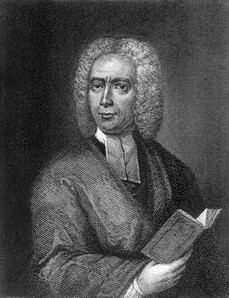 He is critical of Beddome’s clarity and balance but accepts that ‘a strong imagination’ is at work more akin to Newton and Cowper and an advance on Doddridge. Often predictable and homiletic, he rises above this elsewhere. Watson picks out the striking description of death in Hymn 777
He is critical of Beddome’s clarity and balance but accepts that ‘a strong imagination’ is at work more akin to Newton and Cowper and an advance on Doddridge. Often predictable and homiletic, he rises above this elsewhere. Watson picks out the striking description of death in Hymn 777Turned to a mass of rottenness;
The name forgot, the substance gone,
No more admired, no longer known.
A single smile obtain,
The loss of all things I could bear,
And glory in my gain.
Hymn Noah's Ark 331
His Writings 01
 |
| M Henry |
In Beddome’s lifetime he published little. His Midland Association circular letters were published in 1759 and 1765 and some individual sermons and hymns also appeared in his lifetime. On February 27th, 1752, A scriptural exposition of the Baptist Catechism by way of question and answer was issued. (It was republished in 1776 and later again in 1814 and 1849 and is now available in a modern edition). Lamenting the demise of catechising in families and noting the success of a similar effort by Matthew Henry (1662-1714), (Henry’s Scripture Catechism of 1702. He also wrote A plain Catechism for children. Cf Holmes, 62). Beddome wrote,
'May the great God smile upon this faint attempt for his glory, and may that church especially, to which I stand related, accept it as a small acknowledgement of their many favours and a token of the sincerest gratitude and affection from their willing though unworthy servant.'
Catechising, the use of questions and answers to teach Christian doctrine, has a long and honourable history. The early church had a high view of it and appointed catechists whose main work was to catechise men and women and children. Tom Nettles has spoken of the Reformation as ‘The Golden age of catechisms’, the Heidelberg and Westminster Catechisms having had most impact. (Nettles, Teaching truth, training hearts, the study of catechisms in Baptist life, Amityville, New York, Calvary Press, 1998, 17).
In 1680 Hercules Collins (d 1702) adapted the Heidelberg document for Baptist use under the title An orthodox catechism. (Probably connected with the Petty France congregation Collins was initially the respected minister from 1677 of a Baptist church at Wapping, London, that 10 years later moved to Stepney. He had few educational opportunities but authored several books. He suffered imprisonment for Baptist beliefs 1684. He was buried in Bunhill Fields.)
Henry Jessey (1603-1633) another eminent early Baptist, produced a threefold catechism aimed at various levels and called it A catechism for babes or little ones. The simplest of these contained only four questions – what man was, is, may be and must be! See here. (Highly regarded as a scholar, author and humanitarian, Yorkshire born Jessey was a Cambridge graduate. He left parish ministry for London, 1635, and pastured the persecuted church gathered by Jacob and Lathrop from 1637. It divided, 1640, Jessey’s church moving increasingly to a Baptist position. Following a split with Kiffin, 1644, Jessey was baptised as a believer. Despite being identified with Fifth Monarchists at times, he was orthodox. Troubles increased after the Restoration and for a short spell he was in Holland. On returning he died, September 4, 1663. Thousands attended his funeral.)
Several other Baptist catechisms, including one by John Bunyan (1628-1688), have appeared
 down the years but the one that was to become most popular among Particular Baptists was that based on the Westminster shorter catechism and known as Keach’s catechism. (Among General Baptists, Nettles reveals, Thomas Grantham’s 1687 St Paul’s Catechism was popular and Dan Taylor’s later A catechism of instruction for children and youth which had gone through 8 editions by 1810.) Nettles goes as far as to say ‘Perhaps more than all others combined, this catechism defined what it was to be a Baptist throughout the eighteenth century and for some years into the nineteenth.’ (Nettles, 47). The catechism was prepared around 1693, the year in which a general assembly of Particular Baptist churches took place in London and where it was agreed
down the years but the one that was to become most popular among Particular Baptists was that based on the Westminster shorter catechism and known as Keach’s catechism. (Among General Baptists, Nettles reveals, Thomas Grantham’s 1687 St Paul’s Catechism was popular and Dan Taylor’s later A catechism of instruction for children and youth which had gone through 8 editions by 1810.) Nettles goes as far as to say ‘Perhaps more than all others combined, this catechism defined what it was to be a Baptist throughout the eighteenth century and for some years into the nineteenth.’ (Nettles, 47). The catechism was prepared around 1693, the year in which a general assembly of Particular Baptist churches took place in London and where it was agreed'That a catechism be drawn up, containing the substance of the Christian religion, for the instruction of children and servants; and that Brother William Collins be desired to draw it up.' (Nettles, 49).
This (unrelated) Collins was co-pastor with Nehemiah Cox of a church in Petty France, London, from 1673 until his death in 1702. With Cox he had been responsible for publishing the Confession of faith of 1677, the confession ratified in 1689 and known as the Second London Confession. No-one knows why the name of ‘Famous Mr Keach’ is so firmly connected with the catechism. Benjamin Keach (1640-1704) was certainly the leading Baptist of his day. Originally an Arminian, he became a pastor first in his native Buckinghamshire and then in 1668 at Horsley Down, London. A prolific author, in 1664 he had published The Child’s instructor or A new and easy primer. For this he was arrested, jailed, twice pilloried and ‘saw his book burnt under his nose’. (Nettles, 50).
What Beddome’s version of Keach does is to give supplementary questions and Scripture texts for each of the original 114 questions. This catechism was widely used and was reprinted in 1776. In his letter to the Midland Association in 1754 reporting on the church Beddome mentions the successful use of the catechism with all ages. Holmes suggests that it was part of the key to his earlier success in Bourton and points out that later decline coincided with the fall off of its use. (Cf Holmes, 62. He highlights Wilkins’ refusal to engage in catechising due to other engagements. He also notes, 145, that on at least two occasions, 1753 and 1786, the church purchased catechisms for distribution to the poor.) The catechism reveals Beddome to be no Hyper-Calvinist or antinomian but a Strict and Particular Baptist and a Sabbatarian in the best sense.
01/03/2007
Hymn Enoch

330 Enoch LM
DID Enoch walk with God,
His patron and his friend?
Sacred the path in which he trod,
And happier still his end.
2 While others went astray,
Or vile companions chose
His soul maintained the heavenly way
In spite of all his foes.
3 The cause of truth he owned
In that degenerate age
And God the Lord with honour crowned,
His lengthened pilgrimage.
4 The scoffing of men he bore,
But God his way approved;
The unbelieving world no more
Shall scorn the man he loved.
5 Borne on an angel’s wing,
He mounts above the skies;
Exempt from death’s envenomed sting
Behold him joyful rise.
6 Upheld by power supreme,
There’s nought but I could do
Could boldly enter Jordan’s stream
And pass in triumph too.
Character and influence
Hall speaks of his personal acquaintance with Beddome but he was only 31 when the latter died, there being an age gap of nearly 50 years. No doubt the input of Hall’s father, Robert Hall Senior (1728-1791) is significant. The Preface is simply signed R Hall, Leicester and it could possibly be the work of Richard Hall but the former suggestion seems far more likely. Hall was pastor at Harvey Lane, Leicester, 1806-1826. The frontispiece includes ‘Rev R Hall AM’ the same form used in his collected works. Hall gained his MA from King’s College, Aberdeen. The memoir with the works is by Olinthus Gregory, [see pic] mathematician and father-in-law to Samuel Beddome, Benjamin Beddome’s grandson.
 'Mr Beddome was on many accounts an extraordinary person. His mind was cast in an original mould; his conceptions on every subject were eminently his own; and where the stamina were the same as other men’s, (as must often be the case with the most original thinkers) a peculiarity marked the mode of their exhibition .… Though he spent the principal part of his long life in a village retirement, he was eminent for his colloquial powers, in which he displayed the urbanity of the gentleman, and the erudition of the scholar, combined with a more copious vein of attic salt than any person it has been my lot to know.'
'Mr Beddome was on many accounts an extraordinary person. His mind was cast in an original mould; his conceptions on every subject were eminently his own; and where the stamina were the same as other men’s, (as must often be the case with the most original thinkers) a peculiarity marked the mode of their exhibition .… Though he spent the principal part of his long life in a village retirement, he was eminent for his colloquial powers, in which he displayed the urbanity of the gentleman, and the erudition of the scholar, combined with a more copious vein of attic salt than any person it has been my lot to know.'(Robert Hall, Recommendatory preface, Hymns adapted to public worship or family devotion, London, Burton & Briggs and Button & Son, 1818)
As for Beddome’s abiding influence, besides his later published hymns and sermons and his immediate influence on the Bourton congregation (Brooks, 63, ‘As a pastor Mr Beddome seems to have been no less excellent than as a preacher’) and beyond, there was that which came in the shape of men converted under his ministry who later became ministers themselves. As Derrick Holmes remarks (42) the extent of Beddome’s influence on each individual we are about to mention cannot be properly ascertained without more information than we presently have but he must have had some influence on each of the following.
Richard Haines from Burford was converted, shortly before Ryland, who we mentioned in an earlier post, in the 1741 awakening. He began to preach in 1747 and went on to pastor at Bradford-on-Avon from 1750. (The letter of dismissal is in the Bourton old church book, 43. See Appendix 12 in Holmes. Haines ministered at Bradford until his sudden but not wholly unexpected death, 1768. The final year was particularly blessed with some 24 being converted.)
John Ryland Senior became ‘a master preacher’ and ‘a giant in the land’. He was set apart to the ministry in 1746. Following studies in Bristol, he pastored the Castle Hill church, Warwick, where Beddome had once been a frequent visitor. In 1750 he moved to Northampton where he ministered with much success until retirement to Enfield, 1785, where he had a school originally begun in Warwick and carried on in Northampton. (Peter Naylor, John Collett Ryland (1723-1792), BPB 1, 200, 201)
There were several others. Richard Strange became pastor at Stratton, Wiltshire in 1752. Little is known of him. (Presumably he was son to deacon Joseph Strange, mentioned by Holmes, 60, 61. Was Nanny his sister? Cf fn 43).
John Reynolds (1730-1792) from Farmington, baptised in 1743 aged 14, studied in Bristol and for several years often deputised for Beddome. In this period his more settled ministry appears to have been at Cirencester, Cheltenham and Oxford. (Holmes, 46). In 1766 he became minister at Cripplegate, London. He succeeded High Calvinist John Brine (1703-1765) and is buried next to him in Bunhll Fields. Of Reynolds’ ministry The Baptist Register 1794-1797 says ‘Nothing very remarkable attended’ it but he had a marked ‘solicitude for the conversion of souls’, 44. Like Beddome and Ryland he was awarded an MA by the college in Providence, Rhode Island. His father, John Reynolds Senior, who died in 1758 was ‘the oracle of the town’. (Cf Holmes, 60, 61n).
We have mentioned Nathanael Rawlings, from Moreton-in-the-Marsh, baptised in 1750. Another Bristol student, he became pastor in Trowbridge in 1765. His call seems to have been a rather drawn out affair lasting from 1763-1766. He also seems to have had financial difficulties getting through college. See Holmes, 47-49. Rawlings ministered in Trowbridge, 1765-1771, when there was a disruption, and again from 1778 until his death, 1809.
Alexander Paine was a former Methodist preacher who joined the Bourton church in the Autumn of 1775, the same year that he was baptised at Fairford by Mr Davis. His name first came before the Bourton church in 1778 but there was no call until 1780, there clearly being some doubts over his suitability. The church at Bewdley considered calling him for some while but he eventually became minister at Bengeworth from November 1780. (One wonders if the Bengeworth congregation were better able to cope with the remaining Methodist traits in Paine).
Thomas Coles, Beddome’s eventual successor, was baptised and joined the church at the age of 15 or 16. He headed off to study at Bristol 10 days before Beddome died. He went on to gain an MA from the Marischal College, Aberdeen, in 1800. He eventually succeeded Beddome the following year and pastored the church until 1840. (In the intervening period he turned down a call to Cannon Street, Birmingham and worked with Abraham Booth 1734-1806 at Prescott Street, London). His youth does not rule out Beddome’s influence. Even at the age of 11 he was taking extended notes of Beddome’s sermons and at 13 was reading them back at the midweek meeting (Cf Brooks, 82).















